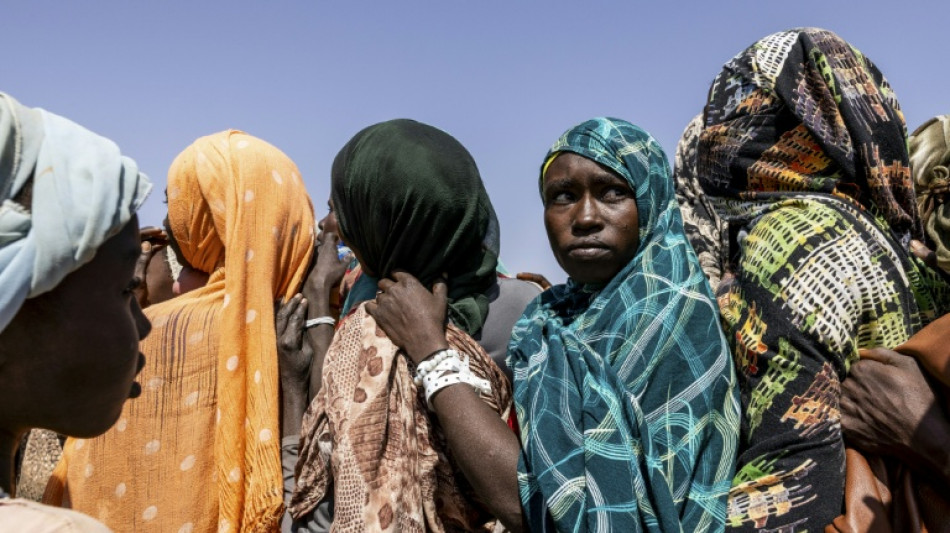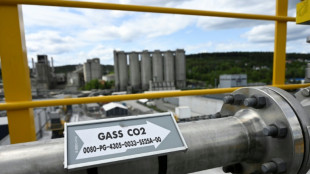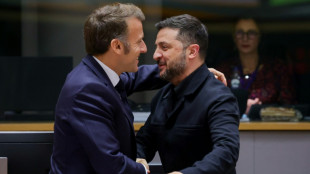
-
 Barca to make long-awaited Camp Nou return on November 22
Barca to make long-awaited Camp Nou return on November 22
-
COP30 talks enter homestretch with UN warning against 'stonewalling'

-
 France makes 'historic' accord to sell Ukraine 100 warplanes
France makes 'historic' accord to sell Ukraine 100 warplanes
-
Delhi car bombing accused appears in Indian court, another suspect held

-
 Emirates orders 65 more Boeing 777X planes despite delays
Emirates orders 65 more Boeing 777X planes despite delays
-
Ex-champion Joshua to fight YouTube star Jake Paul

-
 Bangladesh court sentences ex-PM to be hanged for crimes against humanity
Bangladesh court sentences ex-PM to be hanged for crimes against humanity
-
Trade tensions force EU to cut 2026 eurozone growth forecast

-
 'Killed without knowing why': Sudanese exiles relive Darfur's past
'Killed without knowing why': Sudanese exiles relive Darfur's past
-
Stocks lower on uncertainty over tech rally, US rates

-
 Death toll from Indonesia landslides rises to 18
Death toll from Indonesia landslides rises to 18
-
Macron, Zelensky sign accord for Ukraine to buy French fighter jets

-
 India Delhi car bomb accused appears in court
India Delhi car bomb accused appears in court
-
Bangladesh ex-PM sentenced to be hanged for crimes against humanity

-
 Leftist, far-right candidates advance to Chilean presidential run-off
Leftist, far-right candidates advance to Chilean presidential run-off
-
Bangladesh's Hasina: from PM to crimes against humanity convict

-
 Rugby chiefs unveil 'watershed' Nations Championship
Rugby chiefs unveil 'watershed' Nations Championship
-
EU predicts less eurozone 2026 growth due to trade tensions

-
 Swiss growth suffered from US tariffs in Q3: data
Swiss growth suffered from US tariffs in Q3: data
-
Bangladesh ex-PM sentenced to death for crimes against humanity

-
 Singapore jails 'attention seeking' Australian over Ariana Grande incident
Singapore jails 'attention seeking' Australian over Ariana Grande incident
-
Tom Cruise receives honorary Oscar for illustrious career

-
 Fury in China over Japan PM's Taiwan comments
Fury in China over Japan PM's Taiwan comments
-
Carbon capture promoters turn up in numbers at COP30: NGO

-
 Japan-China spat over Taiwan comments sinks tourism stocks
Japan-China spat over Taiwan comments sinks tourism stocks
-
No Wemby, no Castle, no problem as NBA Spurs rip Kings

-
 In reversal, Trump supports House vote to release Epstein files
In reversal, Trump supports House vote to release Epstein files
-
Gauff-led holders USA to face Spain, Argentina at United Cup

-
 Ecuador voters reject return of US military bases
Ecuador voters reject return of US military bases
-
Bodyline and Bradman to Botham and Stokes: five great Ashes series

-
 Iran girls kick down social barriers with karate
Iran girls kick down social barriers with karate
-
Asian markets struggle as fears build over tech rally, US rates

-
 Australia's 'Dad's Army' ready to show experience counts in Ashes
Australia's 'Dad's Army' ready to show experience counts in Ashes
-
UN Security Council set to vote on international force for Gaza

-
 Japan-China spat sinks tourism stocks
Japan-China spat sinks tourism stocks
-
Ecuador voters set to reject return of US military bases

-
 Trump signals possible US talks with Venezuela's Maduro
Trump signals possible US talks with Venezuela's Maduro
-
Australian Paralympics gold medallist Greco dies aged 28

-
 Leftist, far-right candidates go through to Chilean presidential run-off
Leftist, far-right candidates go through to Chilean presidential run-off
-
Zelensky in Paris to seek air defence help for Ukraine

-
 Bangladesh verdict due in ex-PM's crimes against humanity trial
Bangladesh verdict due in ex-PM's crimes against humanity trial
-
A pragmatic communist and a far-right leader: Chile's presidential finalists

-
 England ready for World Cup after perfect campaign
England ready for World Cup after perfect campaign
-
Cervical cancer vaccine push has saved 1.4 million lives: Gavi

-
 Datavault AI Signs Multi-Million Dollar RWA Services Agreement With Triton Geothermal to Provide Significant Revenue Opportunities
Datavault AI Signs Multi-Million Dollar RWA Services Agreement With Triton Geothermal to Provide Significant Revenue Opportunities
-
Gold Terra is Upsizing Its Private Placement from C$6.3 Million to C$7.0 Million

-
 Compassion Center, the Las Vegas Community, and Loved Ones Honor the Life and Immeasurable Legacy of Julie "Nurse Juhlzie" Monteiro with Community Celebrations December 13-14, 2025
Compassion Center, the Las Vegas Community, and Loved Ones Honor the Life and Immeasurable Legacy of Julie "Nurse Juhlzie" Monteiro with Community Celebrations December 13-14, 2025
-
Snaplii Offers Special Cashback Offers as Holiday Shopping Season Gets Underway

-
 Global Industrial Introduces Mobile Robot Stretch Wrap Machine to Increase Efficiency, Safety and Value in Pallet Wrapping Operations
Global Industrial Introduces Mobile Robot Stretch Wrap Machine to Increase Efficiency, Safety and Value in Pallet Wrapping Operations
-
VSEE Health, Inc. Delivers Robust Q3 2025 Revenue Growth Amid Telehealth Expansion: Total Revenues Reach $3.98 Million, Up 19% Year-Over-Year


'Killed without knowing why': Sudanese exiles relive Darfur's past
Decades after Darfur was the scene of some of the 21st century's worst atrocities, Sudanese exiles say the nightmare has returned as images of fresh bloodshed emerge from the region.
For the diaspora watching from afar, alleged crimes in El-Fasher -- the last army stronghold in Darfur before its fall to paramilitaries last month -- mirror the massacres that once shocked the world.
"Sometimes it's hard to believe it's happening again," said Abdullah Yasser Adam, a researcher from South Darfur's capital Nyala, who now lives in Cairo and uses a pseudonym for security reasons.
"People are being killed without knowing why. It feels like the end of the world."
Adam, 45, belongs to the Fur community, one of several non-Arab groups targeted between 2003 and 2008 in the western region when Omar al-Bashir's government armed Arab militias, the Janjaweed, to crush a rebellion.
He is among six million Sudanese living in exile, including four million who fled after war erupted in April 2023 between the army and the same fighters, now rebranded as the Rapid Support Forces.
Survivors of the RSF assault on El-Fasher described scenes Adam recognised instantly: summary executions, mass flight, and towns burned and emptied at gunpoint.
"Planes overhead, Janjaweed on camels and horses, vehicles on the ground," he said, recalling stories of survivors who staggered into Nyala in 2003.
"People were hunted like prey," he said. "They arrived on foot, many barefoot. Mothers carried children whose malnutrition you could see in their swollen bellies."
"Today, the attacks are the same," he added, "only with more advanced weapons."
- 'Same coin' -
The RSF is led by Mohamed Hamdan Daglo, known as Hemedti, who rose from camel trader to militia commander under Bashir.
Bashir's campaign in Darfur, framed as a counter-insurgency, became a devastating assault on non-Arab tribes demanding equality and political inclusion.
Sudanese-American poet Emtithal Mahmoud, who fled Darfur to the United States at four and returned in 2000 at age six, recalls seeing one of the early crackdowns in her hometown, El-Fasher.
"I remember us seeing the smoke rise from downtown," Mahmoud, 32, told AFP from Philadelphia.
"I hid underneath the bed that day with four other people. I could see the soldiers' boots coming in. And I saw our blood on their ankles," she said.
That war left 300,000 dead and 2.7 million displaced, according to the UN.
Bashir is wanted by the International Criminal Court on genocide charges.
Last week the UN Human Rights Council ordered investigators to probe recent alleged atrocities in El-Fasher.
After Bashir's fall in 2019, Hemedti recast himself as a statesman and army ally, analysts say, but disagreements over integrating the RSF into the military triggered the 2023 conflict.
For Mahmoud, the "Darfur genocide never ended".
"It became more complex politically, but the killing never stopped," she said.
Both sides, she argues, committed past atrocities.
The army "would carpet bomb our villages and the Janjaweed would" wait to kill survivors, she said.
"They would burn crops. They would throw bodies in wells. They would rape women and children."
Adam agreed that "they were two sides of the same coin."
Their roles may have shifted, but "the Sudanese people remain the victims," he said.
During the current war, the army faces accusations of indiscriminate air strikes and chemical weapons use, while the RSF is accused of executions, rape and looting.
- 'Worse than 2003' -
For Amar Salah Omar, a 34-year-old electrician from the Massalit tribe who has lived in Paris since 2016, foreign involvement has made today's war even deadlier.
The United Arab Emirates has been accused of giving the RSF weapons -- a claim it denies -- while analysts say the army is backed by Egypt, Saudi Arabia, Turkey, Russia and Iran.
"What's happening today is even worse than in 2003," Omar told AFP.
The RSF "didn't have as much power" back then, he said, but now "they are untouchable."
With El-Fasher's fall, the RSF controls all five Darfur state capitals, effectively slicing Sudan in two: the army in the north, east and centre, and the RSF ruling Darfur and parts of the south.
Nearly 100,000 people have fled El-Fasher, yet tens of thousands remain trapped in famine conditions after an 18-month siege.
Hospitals and markets have been shelled, and aid has been blocked. Similar patterns are emerging in the neighbouring Kordofan region.
Coman Saeed, a 33-year-old volunteer with Sudan's Emergency Response Rooms network, now exiled in Uganda, warns of a massacre "just like what took place in El-Fasher" if the RSF captures Dilling and Kadugli, two army-held cities in South Kordofan.
In Darfur itself, where the RSF has set up a parallel government, Omar remains in contact with friends in Nyala and other towns.
"They live in fear of being targeted," he said.
burs-maf/jfx
D.Sawyer--AMWN